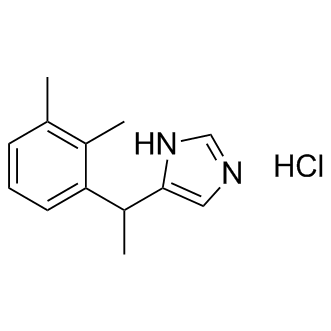All AbMole products are for research use only, cannot be used for human consumption.

Medetomidine is a selective α2-adrenoceptor agonist, with Ki of 1.08 nM, exhibts 1620-fold selectivity over α1-adrenoceptor.
| Cell Experiment | |
|---|---|
| Cell lines | A549 human alveolar epithelial cells |
| Preparation method | Cells were challenged with 500 μM H2O2 in fresh RPMI 1640 medium without FBS for 24 hours in the control group, while, in the treatment groups, the cells were pretreated with 1 nM medetomidine for 15 minutes, in the presence or absence of 10 nM atipamezole, a synthetic α 2-adrenergic antagonist and then exposed to 500 μM H2O2 for additional 24 hours. |
| Concentrations | 1 nM |
| Incubation time | 15 min |
| Animal Experiment | |
|---|---|
| Animal models | C57BL/6N mice |
| Formulation | physiological saline solution |
| Dosages | 1 mg/kg |
| Administration | i.p. |
| Molecular Weight | 236.74 |
| Formula | C13H16N2.HCl |
| CAS Number | 86347-15-1 |
| Solubility (25°C) | DMSO 10 mg/mL |
| Storage |
Powder -20°C 3 years ; 4°C 2 years In solvent -80°C 6 months ; -20°C 1 month |
| Related Adrenergic Receptor Products |
|---|
| Indoramin
Indoramin is a selective α1A-adrenoceptor antagonist. |
| Ro 363 hydrochloride
Ro 363 hydrochloride is a potent and highly selective β1-adrenoceptor agonist. Ro 363 hydrochloride is also an effective inotropic stimulant. Ro 363 hydrochloride is a cardiovascular modulator that reduces diastolic blood pressure and pronounces increases in myocardial contractility. |
| Phentolamine
Phentolamine is a potent, selective and orally active α1 adrenergic and α2 adrenergic receptor antagonist. |
| Dipivefrin
Dipivefrin is a potent adrenergic agonist. |
| HOKU-81
HOKU-81 (4-Hydroxytulobuterol) is one of the metabolites of Tulobuterol. |
All AbMole products are for research use only, cannot be used for human consumption or veterinary use. We do not provide products or services to individuals. Please comply with the intended use and do not use AbMole products for any other purpose.


Products are for research use only. Not for human use. We do not sell to patients.
© Copyright 2010-2024 AbMole BioScience. All Rights Reserved.
